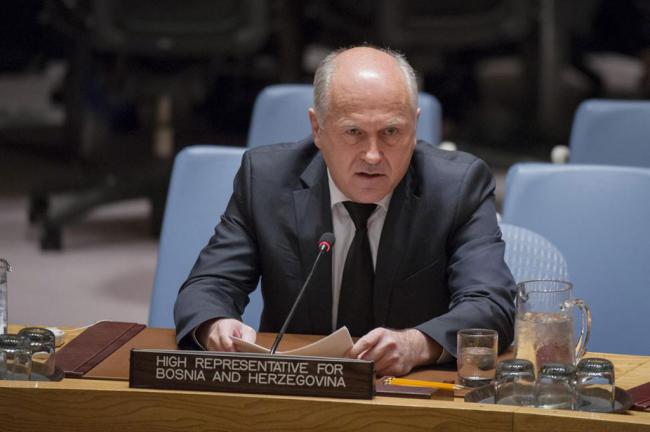
Challenges to peace accord ‘cast shadow’ on Bosnia and Herzegovina’s progress, Security Council told
“Questioning and challenging the fundamentals of the peace agreement is not a formula for success,” Valentin Inzko, the High Representative for Bosnia and Herzegovina, told the Council, citing the continued policy by representatives of the ruling party in the Republika Srpska (RS), in particular, its President, to advocate for the secession of that entity from Bosnia and Herzegovina.
“I remain concerned that this party's official platform includes a threat to organize an independence referendum in 2018 if certain conditions are not met,” he said, reiterating that the peace agreement does not grant the entities the right to secede, and any attempt to change the peace agreement requires the agreement of all the parties.
Sharply divergent reactions to the recent UN tribunal’s guilty verdict against former Bosnian Serb leader over the 1995 massacre in Srebrenica highlighted the need for greater efforts towards reconciliation in Bosnia and Herzegovina, he said.
In our countries it would be unthinkable to glorify individuals convicted of committing mass atrocities
He said he was “deeply shocked” by the high-profile opening by the current Republika Srpska President of a dormitory named after Karadzic, only two days before his first instance conviction for genocide and crimes against humanity at the International Criminal Tribunal for the former Yugoslavia (ICTY) in The Hague.
“In our countries it would be unthinkable to glorify individuals convicted of committing mass atrocities,” he said. “With this act, the RS President sent an insidious message to those affected by the horror and trauma of wartime ethnic cleansing, and put himself outside the standards and morality of the civilized world.”
Processions organized in March in Srebrenica and other municipalities to celebrate the acquittal of Serbian politician Vojislav Šešelj on war crimes charges raised fear among Bosniak returnees who are still trying to come to terms with the crimes of the past, he added.
Other direct challenges to the peace agreement included the RS government concluding in December that the entity’s institutions would cease cooperating with SIPA, a state-level police agency, over a legally authorized raid on a police station in the RS as part of a war crimes investigation.
While the RS authorities eventually resumed operational cooperation under a signed agreement, this apparent interference of politics into police work is unacceptable, he said.
On the positive side, the country submitted its membership application with the European Union. Associated with this, the authorities also took steps to implement reform, including the adoption of new labour legislation in both entities, RS and the Federation of Bosnia and Herzegovina.
Although the RS has still not officially withdrawn the referendum, it does appear to have been put aside.
Another positive factor has been the regional situation. The Serbian Prime Minister’s high-profile commitment of notable donor funds to Srebrenica had done much to foster reconciliation; and the convening of the first joint session of the Council of Ministers of Bosnia and Herzegovina and the Government of Serbia in November was a positive step forward. A similar joint session with the Croatian government has been announced.
With these mixed developments on the ground over the last six months, “it remains unclear at what point we can say Bosnia and Herzegovina is irreversibly on course for Euro-Atlantic integration,” he said.
On the security front, he said that a terrorism-inspired act carried out by a single attacker in Sarajevo on 18 November killed two soldiers of the Armed Forces of Bosnia and Herzegovina. Another concern is the participation of some citizens of Bosnia and Herzegovina in foreign conflicts, some of whom have returned and could present a threat for the future stability of the country.
Given the complex environment, he said, the presence of the EUFOR, or European Union Force, in Bosnia and Herzegovina with an executive mandate remains of vital importance, enabling his office and others in the international community to fulfil respective mandates as well as reassuring citizens from all ethnic groups throughout the country of a safe and secure environment.
On the next local elections to be held on 2 October, it is not only essential that these local elections are held to the highest standards, but now critical that local elections be held in Mostar, he said. At the moment, that will not be the case because the parties continue to fail to implement the 2010 ruling of the Constitutional Court of Bosnia and Herzegovina.
Concluding his remarks on a positive note, he reported that a few days ago, several local associations agreed to create a single karate association for the whole country. This small step required 20 years of efforts. And the day after on Friday, the Ferhadija Mosque in Banja Luka, demolished in the war, will be reopened - an event of wider significance for reconciliation and tolerance in the region, he said.
UN Photo/Rick Bajornas
Support Our Journalism
We cannot do without you.. your contribution supports unbiased journalism
IBNS is not driven by any ism- not wokeism, not racism, not skewed secularism, not hyper right-wing or left liberal ideals, nor by any hardline religious beliefs or hyper nationalism. We want to serve you good old objective news, as they are. We do not judge or preach. We let people decide for themselves. We only try to present factual and well-sourced news.







